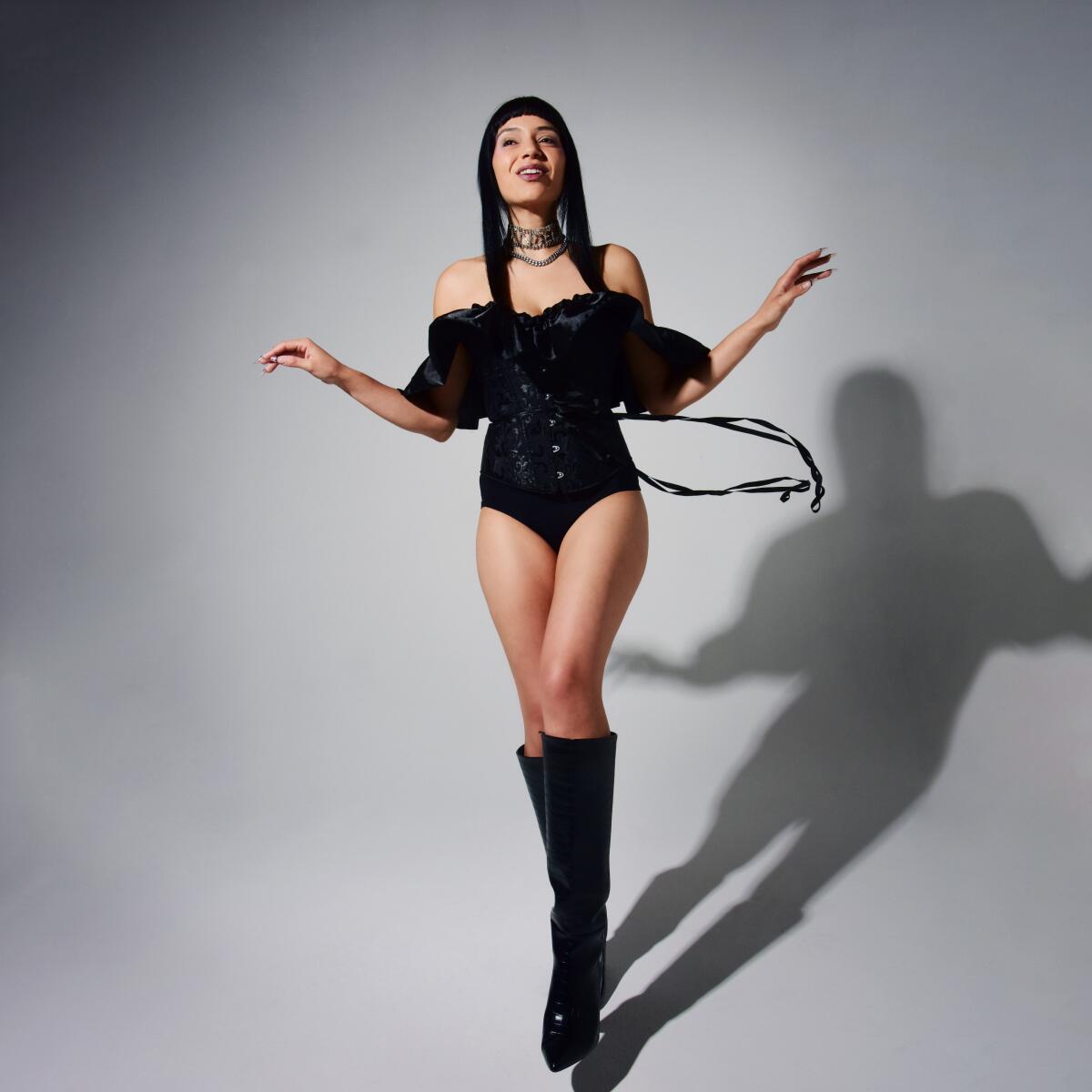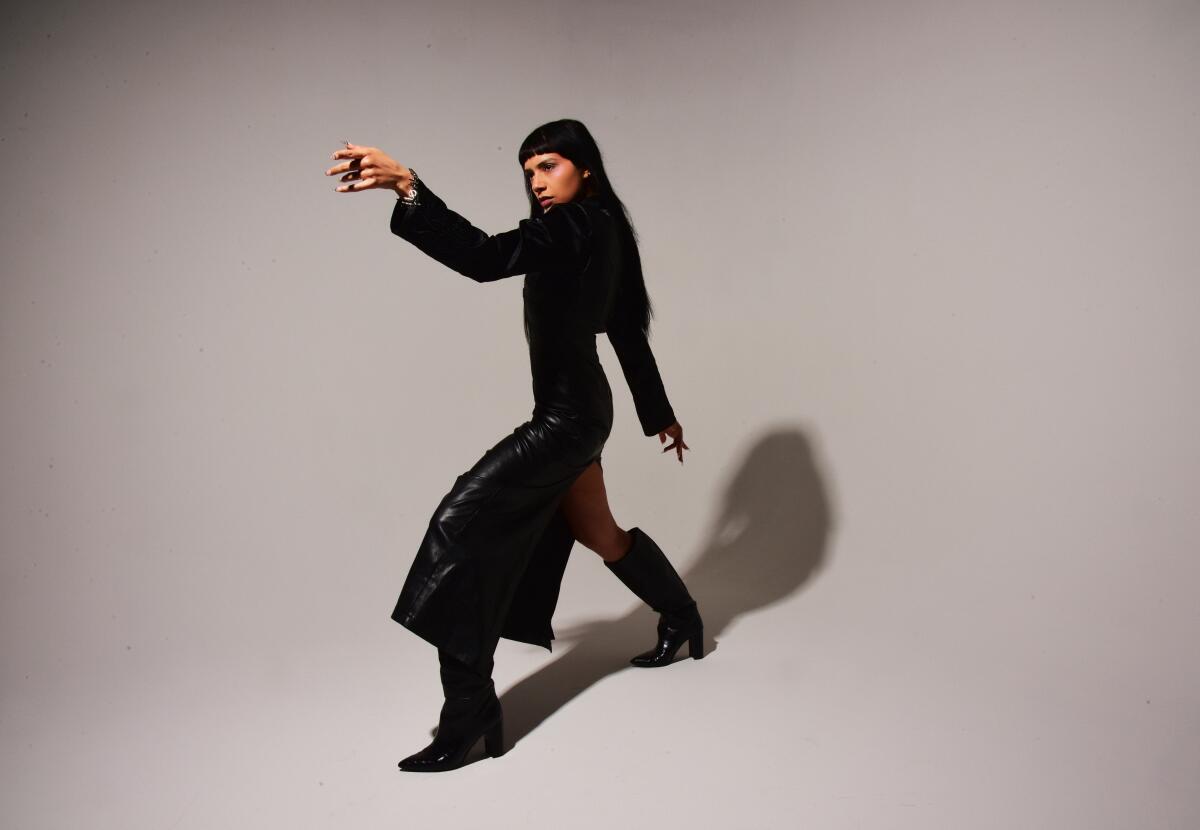It also is a study of dualities, whether of culture, gender or language. For the first time, Garcia sings almost entirely in Spanish, something she first experimented with on 2020’s “Cha Cha Palace.” A move back to L.A. from Virginia in the spring of that year led her to reconnect with her Latin heritage, and with it her ancestry.
As a result, “Gemelo” is a fascinating mix of the mystical and the feminine, of self-love and grief, that glides effortlessly from synth-pop to cumbia to trip-hop. Songs like “Color de Dolor” or “Juanita” slink and shimmy infectiously, even as they channel generational trauma or commune with the dead.
“It really means a lot that I’m writing a song about intuition in Spanish and how it’s connected to our ancestry, and there are people in the audience that are like, ‘Yeah!’” Garcia says over a Zoom call, just after stepping offstage at a festival in Germany. “Maybe that’s my weirdo perspective, but that’s kind of what I do.”
On the heels of her album’s Friday release, Garcia discussed the upheaval that spawned the album, her difficulties writing in Spanish, and how creating the new songs helped her to know and assert herself better than ever before.
There are all these dualities on “Gemelo,” and so much self-discovery. What started that journey for you to explore those themes?
It’s kind of just what was coming out at the time, to be honest. There was a lot grief processing, different types of big life changes happening at the same time. The first song to come out was “Color de Dolor.” That kind of represents that, because when you’re asking, “What is the color of pain? What is the color of grief?” — it can have many forms.
What kinds of grief were you processing?
I was reconciling distance from people that I loved, but also realizing that, being close to them, I didn’t necessarily feel particularly good either. Because sometimes the people that raise you, although there’s love there, it doesn’t necessarily mean that you’re seen.
There was also this strange cultural tug of war that I was feeling within myself. I was working really hard at the time to educate myself about ancestors and generations past in the family. The more I started down that rabbit hole, the more I realized, wow, these are things that I’ve always felt in me, that I’m only discovering now. So there’s a weird sadness that comes with that too.
[And] also just being a woman and feeling like I was really tired of having people speak for me and on my behalf.

Was family history or ancestry part of your life growing up?
My family moved to Virginia when I was a teenager … so I went from having Latino, Mexican American, Chicano culture all around me to, suddenly, it was very hard to come by. That separation from my culture, I had to work hard to keep it alive within me.
With “Gemelo,” I really began to realize the severity of the grief I’d been given. There was a lot that I wanted to know that sometimes even my family themselves couldn’t answer, and I had to go deeper to figure out.
What sorts of things do you feel you’ve figured out?
Patterns, like questions of nature and nurture. For example, alcoholism. You look back and go, “Oh, this person had it. This person had it.” Or maybe I realized there are abandonment wounds in my family. And it’s very interesting, when you think back to the time in which people were born. For women, especially — my mom, my grandma couldn’t make choices that I can make now.

“I can just be. And just being is so much,” says Garcia.
(Shervin Lainez)
What did being in L.A., and presumably being around more family, add to that process?
It felt like I had a little more clarity, so when I came back I felt more of the things that I loved and wanted to preserve. And also the things that were like, “It’s time to abolish this. I’m over it.”
What made you decide to sing most of this album in Spanish?
My grandmother’s like a mother to me, and I realized, when I brought home the LP of “Cha Cha Palace,” that she didn’t understand anything. Over time, as I got better with my Spanish, I remember sitting with my grandmother and I was like, “Holy s—, you’re so funny.” And I had no idea, because I was so bad at Spanish.
How was it to trying to actually write in Spanish, then?
It was pretty brutal. Everybody that I showed it to had a problem with how I expressed myself. … I was also being stubborn in the sense I still wanted it to be in my voice, as a human and as a writer. A lot of people I showed it to wanted to rewrite the whole thing. So it was a pretty arduous process that almost took me out a few times.
Did you speak Spanish a lot at home as a kid, or was it mostly English?
The first thing I ever spoke were prayers that my grandmother taught me in Spanish, and we spoke it a lot at home. But then with public schooling and everything, it kind of disappeared. The older I got, the more conversations I had with other first-gen, second-gen kids like me, that was a common thing.
But yeah, I mean, the first music that I learned how to sing, as well, with my mom was mariachi music, because she was a mariachi singer, like ranchera music. As a child, she sang it at rodeos with the whole outfit and everything. So it was a thing we did at parties.

Does it feel risky at all, commercially, to sing mostly in Spanish, or does it feel like now’s a good moment in terms of how receptive general audiences would be?
I kind of don’t care. So many countries speak Spanish, and it’s such a poetic language. It’s beautiful. The more I started to express myself, the more I was like, “Oh, English kind of feels like a sword fight.” It’s very precise and very cunning. Spanish, it’s just very romantic. And Latino music always hits hard at parties.
Are you able to express yourself in certain ways in Spanish that you maybe couldn’t in English?
I got to be more philosophical. Like “El Que,” for example, is an inner monologue, my spirit watching over my flesh body going through something and guiding it, trying to wake up the person below. So I got to play with perspective. I don’t know, maybe it just felt more natural for me to do it in Spanish than it did in English because it was me doing something different than I normally do.
That goes back to that idea of dualities. Is there a particular duality that feels most central here?
The biggest one to me was body and spirit. I think our bodies get so in routine and focused on survival. But I’ve always been a spiritual person. I’ve always felt like when I’m able to step outside myself, there’s a spirit self that guides me. Some people call that intuition.
Some of those dualities could easily turn into a divided self. But you treat it more like a special perspective, like you can see things from different sides.
So many things went into that. In going back home, I’d been thinking, “Oh, if I just go back to L.A., I’ll be seen by my culture, my people.” And then it was like, no, that didn’t happen. These identities that we tie ourselves to, it’s bigger than that. Your people are the people that see you and understand you.
That being said, I am still Latina. I am still queer. I’m still these things. But it’s much bigger than I thought.

“On this record, I tapped into a very specific type of rage that comes from femininity. I also think I showed love and gentleness,” Garcia says of “Gemelo.”
(Shervin Lainez)
You mentioned the idea of being a woman and how other people were always speaking for you. How do you feel you were able to speak for yourself here?
On this record, I tapped into a very specific type of rage that comes from femininity. I also think I showed love and gentleness.
You have a song like “El Que” that talks about how sometimes people don’t understand how intelligent you are. … It happens to women all the time. We’re just used to that rage, the fact that we have to get used to that and have to navigate it.
Then there’s the mysticism and wonder I see in “Juanita.” And on the other end of the spectrum is “Paloma,” where I’m talking about the divine reflected in people, how that is beauty, that is love.
What do you feel making this album has done for you, more broadly, for where you are in life, as Angélica Garcia, right now?
I definitely feel way more like I just have to speak very loudly and clearly in my voice. I realized how much of my life I had felt conditioned to check on other people first. A lot of my Latina friends, we’ve talked about that, how we’re conditioned to take care of our families and the men in our family and the youth, and not feeling guilty about just doing my damn thing.
It’s been very affirming to see people support that. So I need to do that and not feel a pressure to make a certain kind of thing, or be more polite, or be more sexual, or be more anything. I can just be. And just being is so much.
